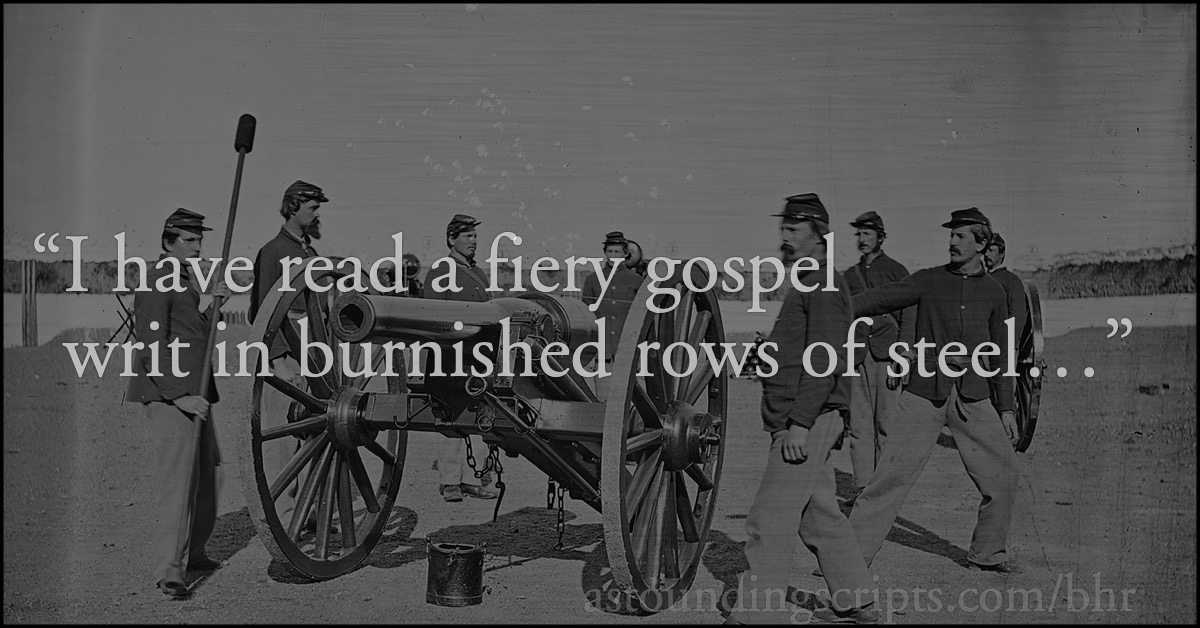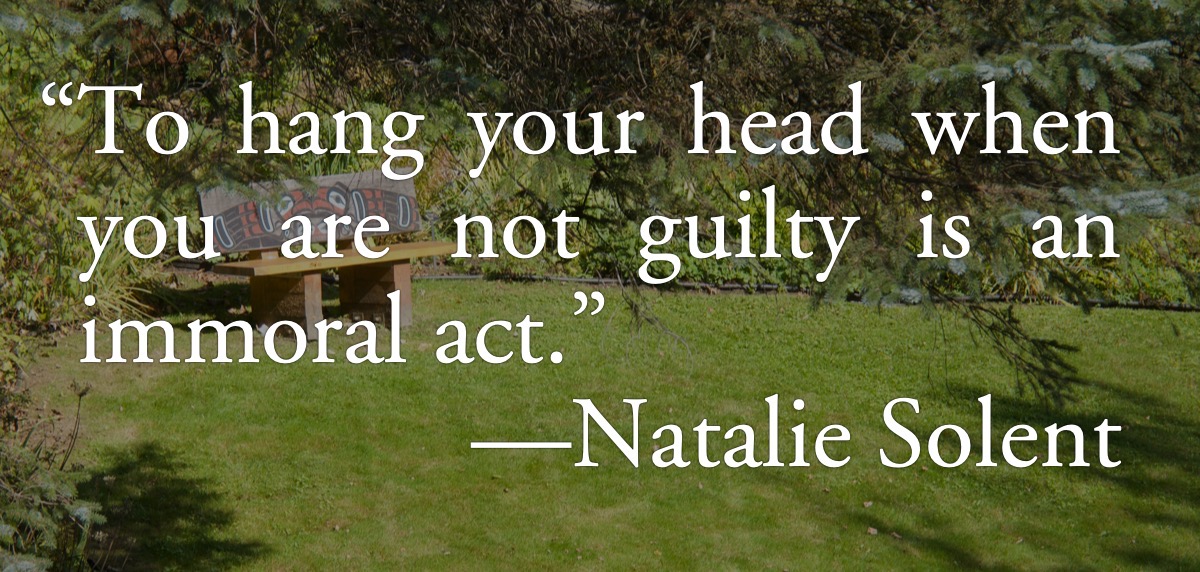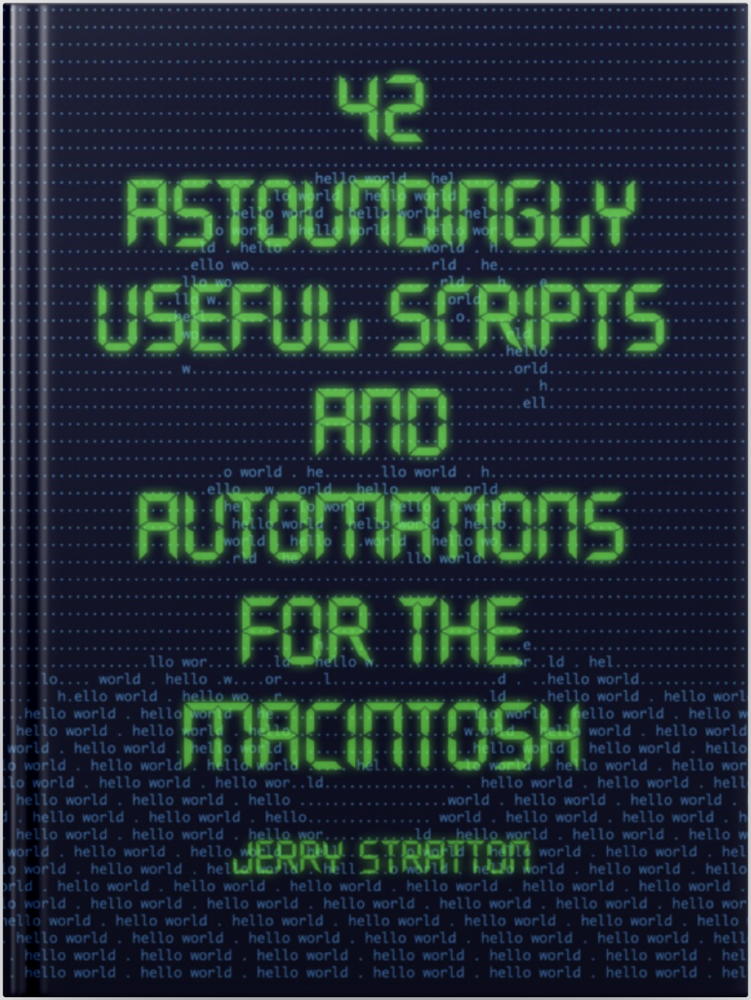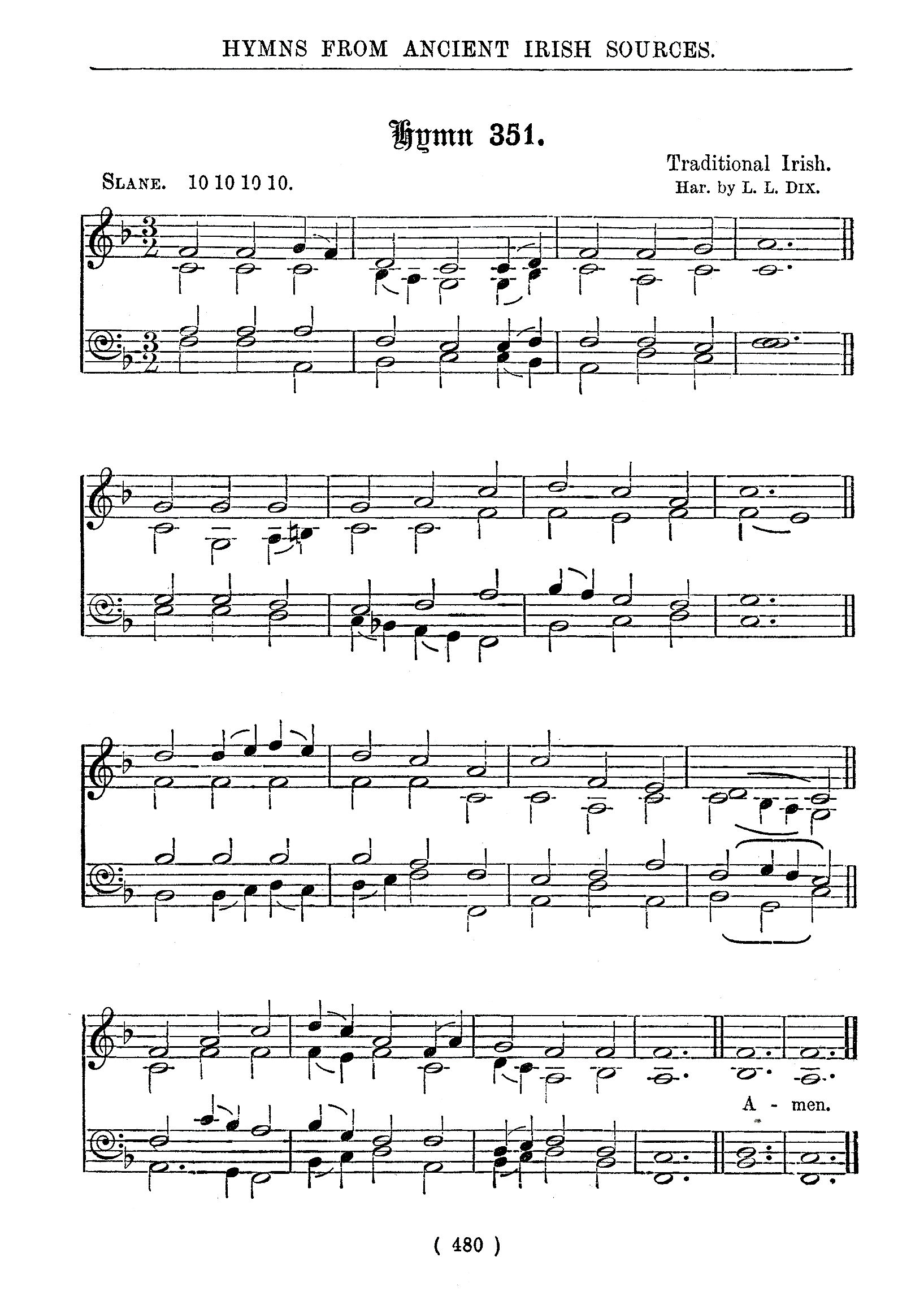
A hundred and fifty-nine years ago, on November 18, 1861, Julia Ward Howe heard the song John Brown’s Body (lies a-mouldering in the grave) sung by Union troops in Upton’s Hill just outside of Washington, DC. She was inspired in the night with new lyrics to go along with the melody, literally couldn’t sleep until she put the lyrics to paper.
The rest is history. Her new lyrics over an old melody have uplifted generations of Americans from the soldiers of the Civil War through the mourners of John F. Kennedy.
But that is not the entire story. It’s common knowledge that the melody is from the older John Brown’s Body, and mostly common knowledge that the John Brown in the song was not the abolitionist John Brown who raided Harper’s Ferry back in 1859. People just naturally made the association after the raid.
What is not common knowledge is that Julia Ward Howe’s husband, Samuel Gridley Howe, was part of an abolitionist group that funded John Brown before the raid. How much they supported the raid is unknown, but it was very likely more than just chance inspiration that inspired Julia Ward Howe to take a melody from a song that had become linked with John Brown the abolitionist and marry it to a rousing anti-slavery battle hymn.
Assuming that the basics of the story are correct, Julia Ward Howe wrote the lyrics on November 18, 1861.1 It was published in The Atlantic Monthly of February 1862. There were still three years of war to follow.
Many modern singers change the semi-final verse2 from “let us die to make men free” to “let us live to make men free”. This originally struck me as wrong and as an affront to the incredible sacrifices of Union soldiers who gave their lives to end slavery in the United States.
I still prefer the original lyrics when I play it myself, but I’m coming around to not just accepting the change but supporting it. The original lyrics were written during a war, for soldiers and families of soldiers, to destroy an evil in pure form. Evil always returns, and not always in such an obvious manner. It is always a fight to keep men free, and evil often masks itself behind good intentions. Ronald Reagan famously said that we are always one generation away from slavery. Reagan and Abraham Lincoln both warned us that we must dedicate not only our dying but our living to keeping America a land of the free.

There are always people who wish to import hirelings and slaves, to enable human trafficking at the border; there are always people who wish to impose rules they don’t follow on everyone else, who claim to stamp their boots upon our faces for the good of all. Who want to tell us how much we’re allowed to make, where we’re allowed to work, and when we’re allowed to work. That mob violence is justice. That our work and our lives are not as essential as theirs. As Lincoln less-famously said about the political establishment of his time,
They are the arguments that kings have made for enslaving the people in all ages of the world. You will find that all the arguments in favor of kingcraft were of this class; they always bestrode the necks of the people—not that they wanted to do it, but because the people were better off for being ridden. That is their argument and this argument of the judge is the same old serpent that says, “You work and I eat, you toil and I will enjoy the fruits of it.” — Abraham Lincoln (The Life and Writings of Abraham Lincoln)
The serpent continues to speak through the mouths of men like “the judge”, Stephen Douglas’s political heirs: you are not capable of freedom. We will assume the burden for you.
And the song replies, it is not for men to enslave you but God to transfigure you. In the one lies evil; the other, grace. The way we fight the ideology of slavery today is not by dying, but by living. Live free, as author Sarah Hoyt often says, and “we win, they lose.”
Among just reasons for war, the ending of slavery must list high, and this song is a reminder that out of great carnage can come great good•—if we remain committed to freedom. But that commitment must remain after the war is done. There is great bravery in dying for freedom, but there’s also bravery in living for freedom when all around you are living to submit to the Stephen Douglases of the world. That, also, is a bravery worth singing of.
I have seen Him in the watch-fires; I have read His fiery gospel; I have heard His trumpet call. It will never sound retreat.
I originally created this music file for use with the piano script to show off the new clipper script in Astounding Scripts’s Catalina edition. In the middle of the melody I inserted some backmasking using GarageBand; the clipper script can reveal that backmasking. But it’s a great song, and it deserves more than a passing reference in a frivolous snippet.
As is becoming usual, I provide the piano files here as separate treble and bass clefs. So you can play it like this:
- piano [ Battle\ Hymn\ bass.txt ] Battle\ Hymn.txt
You can save it as a MIDI file by just adding --save glory.midi to the end of the line. Or you can turn it into separate MIDI files by playing each part separately:
- piano Battle\ Hymn.txt --save treble.midi
- piano Battle\ Hymn\ bass.txt --save bass.midi
Then you can import the two MIDI files into GarageBand—or any music program that supports MIDI files—to apply whatever instrument settings you want to the two tracks individually. I used Toccata Organ for the treble clef in the first and third verse, and switched to Chamber Choir for the middle verse. I used Tuba for the bass clef throughout.
You can copy and paste the melodies from this page, or download the zip file (Zip file, 4.0 KB). The zip file also includes the MIDI files I used in GarageBand.
The treble clef:
- # The Battle Hymn of the Republic
- # Julia Ward Howe, William Steffe
- # treble clef
- --key B-
- --tempo 92
- 4 "-D F" | 8 "-D. F." 16 "-D F" 8 "-D. F." 16 "-C E" 8 "-B. -D." 16 "-D F" 8 "F. B." 16 "F C"
- 8 "F. D." 16 "F D" 8 "F. D." 16 "E C" 4 "D B"
- 8 "F. B." 16 "F A" | 8 "E. G." 16 "E G" 8 "E. G." 16 "F A" 8 "G. B." 16 "F A" 8 "G. B." 16 "E G"
- 8 "-D. F." 16 "E G" 8 "-D. F." 16 "-B -D" 4 "-D F"
- 8 "-D. F." 16 "-D F" | 8 "-D. F." 16 "-D F" 8 "-D. F." 16 "-C E" 8 "-B. -D." 16 "-D F" 8 "F. B." 16 "F C"
- 8 "F. D." 16 "F D" 8 "F. D." 16 "E C" 4 "-D B"
- 4 "F B" | "G C" "G C" "F B" "F A" | 2 "F. B." 4 R
- # Refrain
- 4 "-D. F." 8 "-C E" "-B. -D." 16 "-D F" 8 "D. B." 16 "E C"
- 2 "F D" 4 "F B" R | "E. G." 8 "F A" "G. B." 16 "F A" 8 "G. B." 16 "E G" | 2 "-D F" "-B -D"
- 4 "-D. F." 8 "-C E" "-B. -D." 16 "-D F" 8 "-D. B." 16 "E C" | 2 "F D" 4 "F B" "F B"
- "G C" "G C" "F B" "F A" | 2 "F. B." 4 R
The bass clef:
- # The Battle Hymn of the Republic
- # Julia Ward Howe, William Steffe
- # bass clef
- --key B-
- --tempo 92
- 4 "-B B" | 8 "-B. B-." 16 "-B B" 8 "-B. B." 16 "-B F" 8 "-B. F." 16 "-B B" 8 "-D. B." 16 "F A"
- 8 "B. B." 16 "B B" 8 "B. B." 16 "F A" 4 "-B B"
- 8 "-D. B." 16 "-D B" | 8 "E. B." 16 "E B" 8 "E. B." 16 "E B" 8 "E. +E." 16 "E +E" 8 "E. +E." 16 "E B"
- 8 "-B. B." 16 "-B B" 8 "-B. B." 16 "-B F" 4 "-B B"
- 8 "-B. B." 16 "-B B" | 8 "-B. B." 16 "-B B" 8 "-B. B." 16 "-B F" 8 "-B. F." 16 "-B B" 8 "D. B." 16 "F A"
- 8 "B. B." 16 "B B" 8 "F. B." 16 "F A" 4 "-B B"
- 4 "-D B" | "E B" "E +E" "F D" "F C" | 2 "-B. D." 4 R
- # Refrain
- 4 "-B. B." 8 "-B B" "-B. F." 16 "-B B" 8 "-B. B." 16 "-B B"
- 2 "-B B" 4 "-D B" R | "E. B." 8 "E B" "E. B." 16 "E B" 8 "E. B." 16 "E B" | 2 "-B B" "-B F"
- 4 "-B. B." 8 "-B B" "-B. F." 16 "-B F" 8 "-B. F." 16 "-B F" | 2 "-B B" 4 "-D B" "-D B"
- "E +E" "E C" "F D" "F +E" | 2 "-B. D." R
Finally, here’s a very moving rendition of this song from Judy Garland. She sang it in honor of John F. Kennedy after his assassination in 1963:
Enjoy!
Depending on how late she wrote the lyrics, it could have been in the early morning of November 19.
↑Howe wrote a sixth verse that wasn’t originally published and isn’t usually included today.
↑
- 42 Astounding Scripts, Catalina edition
- I’ve updated 42 Astounding Scripts for Catalina, and added “one more thing”.
- Battle Hymn of the Republic at Wikipedia
- “Howe wrote her lyrics to the music of the song ‘John Brown’s Body’ in November 1861 and first published them in The Atlantic Monthly in February 1862. The song links the judgment of the wicked at the end of the age (through allusions to biblical passages such as Isaiah 63 and Revelation 19) with the American Civil War.”
- Battle Hymn of the Republic for piano (Zip file, 4.0 KB)
- The text files for playing Battle Hymn of the Republic using the piano script from 42 Astounding Scripts. Also includes the MIDI files created by that script.
- Civil War Photographs
- “The pictures listed in this select list of photographs are in the Still Picture Branch of the National Archives and Records Administration (NARA). Most are part of the Records of the Office of the Chief Signal Officer (Record Group 111) and Records of the War Department General and Special Staffs (Record Group 165). The records include photographs from the Mathew B. Brady collection, purchased for $27,840 by the War Department in 1874 and 1875, photographs from the Quartermaster's Department of the Corps of Engineers, and photographs from private citizens donated to the War Department.”
- Judy Garland: Battle Hymn of the Republic
-
 “One of the greatest songs that was ever written…” Judy sings the Battle Hymn of the Republic in commemoration of the death of President John F. Kennedy, December 13, 1963.
“One of the greatest songs that was ever written…” Judy sings the Battle Hymn of the Republic in commemoration of the death of President John F. Kennedy, December 13, 1963.
- Matthew Brady slideshow at Mimsy@YouTube
- Slide show of Matthew Brady Civil War photos from the National Archives, using Battle Hymn of the Republic.
- Secret Six at Wikipedia
- “The so-called Secret Six, or the Secret Committee of Six, were a group of men who secretly funded the 1859 raid on Harper’s Ferry by abolitionist John Brown.”
- The Soul of Battle: From Ancient Times to the Present Day, How Three Great Liberators Vanquished Tyranny•: Victor Davis Hanson (paperback)
-
 “For a few brief months in the winter and spring of 370-369 a single man had created a vast democratic army that changed the course of Greek history. So too in a matter of weeks Sherman fashioned the Army of the West into the most lethal army the world had yet seen. In less than a year George Patton had turned 250,000 amateur American recruits into a mobile and lethal force that could charge ahead at forty miles and more a day through enemy-occupied territory.”
“For a few brief months in the winter and spring of 370-369 a single man had created a vast democratic army that changed the course of Greek history. So too in a matter of weeks Sherman fashioned the Army of the West into the most lethal army the world had yet seen. In less than a year George Patton had turned 250,000 amateur American recruits into a mobile and lethal force that could charge ahead at forty miles and more a day through enemy-occupied territory.”
- White Supremacy: The Reincarnation of Stephen Douglas
- The modern Democratic Party, and the left in general, seems to be reincarnating Stephen Douglas and other early Democrat defenders of slavery and white supremacy. “That’s mighty white of you,” they say, when blacks show independence and reason.
More abolition
- The Star-Spangled Banner in MIDI
- What could be more appropriate for the fireworks of the Fourth of July than a song about bombs bursting in air, illuminating a great flag rippling defiantly to a hostile world?
- Narrative of the life of Frederick Douglass, an American slave
- Not only does slavery make life worse for slaves, it doesn’t make life better for slave-owners. And the ultimate freedom is freedom to learn.
More Civil War
- The Life and Writings of Abraham Lincoln
- As the founding president of the Republican Party and the man who guided the United States through the incredible sacrifices of the Civil War and the abolition of slavery, Abraham Lincoln deserves more than adulation. He deserves to be read.
- Senator Kamala Harris calls for slavery reparations
- California Senator and 2020 presidential candidate Kamala Harris calls on Democrats to support reparations to descendants of former slaves, and to descendants of Union soldiers who died freeing them.
- ‘They were not patriots’: New Orleans removes monument to Democrats
- Monuments to Democrats are increasingly under fire in their former firewall states.
More MIDI
- Save That Thou Art
- High King of heaven, when vict’ry is won/May I reach heaven’s joys, bright heaven’s Sun!/Heart of my heart, whatever befall,/Still be my vision, O Ruler of all.
- The Star-Spangled Banner in MIDI
- What could be more appropriate for the fireworks of the Fourth of July than a song about bombs bursting in air, illuminating a great flag rippling defiantly to a hostile world?
- O Little Town of Bethlehem
- How still we see thee lie. Play this song on your Mac’s command line with the piano script.
- How Great Thou Art
- Then sings my soul…
- Tidings of Comfort and Joy
- One of my favorite Christmas songs. Save us all from Satan’s power, and tidings of comfort and joy.
- Two more pages with the topic MIDI, and other related pages
More patriotism
- Let mortal tongues awake
- Samuel Francis Smith’s America—more commonly known as “My Country, ’Tis of Thee”— is short, direct, and a wonderful hymn to God as the soul of liberty. It’s a perfect hymn for the Fourth of July. It’s also very easy to play using the piano script from 42 Astounding Scripts.
- A Song of Thanksgiving: America, the Beautiful
- America, the Beautiful, by Katharine Lee Bates, with melody by Samuel A. Ward.
- I pledge a waffle to the flag
- And will totally Like it on FaceBook, until such time as I Unlike it. Loyalty, fidelity, constancy, and waffles.


Be swift my soul to answer him; be jubilant, my feet.